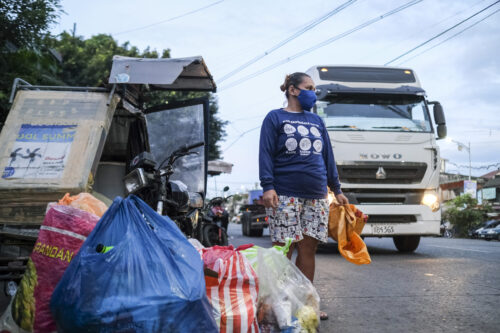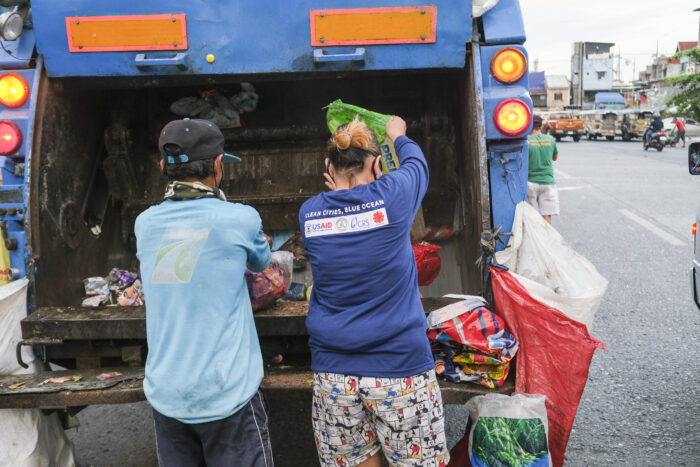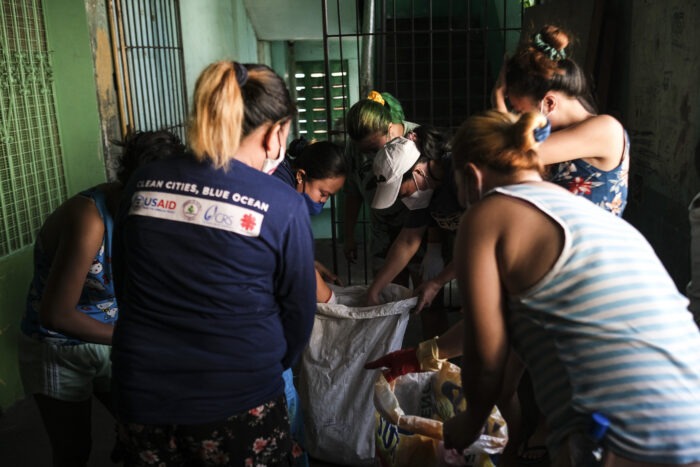From the Field: Strengthening Local Waste Systems from Top to Bottom

In January 2021, USAID’s Clean Cities, Blue Ocean Program officially announced its first grants in the Philippines to implement new, locally-led solutions to address ocean plastic pollution. Over the last year, the program’s first-awarded grantee, Catholic Relief Services (CRS) and their partner Caritas Pasig, Inc., have worked in the City of Manila to improve solid waste management (SWM) through a multi-pronged approach: strengthening local government capacity and planning, promoting more sustainable community practices amongst community members, and empowering waste collectors who are vital to local waste systems.
Grant Highlights:
- Built the capacity of more than 175 local government officials and community members from six barangays (“neighborhoods” and the smallest administrative division, in Tagalog) on SWM planning and waste analysis;
- Forged partnerships with 21 local businesses that signed on to provide ongoing support to the city’s growing circular economy;
- Identified and empowered over 140 SWM Ambassadors to encourage households to adopt 3R (reduce, reuse, recycle) and other more sustainable SWM practices; and
- Improved the livelihoods of 68 individuals—namely, women and waste collectors, who are commonly underrepresented—and, in turn, expanded local waste services through training and small livelihood grants.
Learn more about the approach and impact, below.
Building Local Government Capacity for More Robust and Inclusive Solid Waste Planning
To build strong circular waste systems in these Metro Manila communities, USAID and CRS began by identifying six local barangays and assessing their current local systems and SWM plans to gauge opportunities for enhancement. CRS collected data from similar barangays to develop a baseline study, barrier analysis, and a Waste Analysis Characterization Study (WACS) to inform capacity building and planning needs.
From these initial analyses, CRS identified three key areas to build local government capacity: planning, programming, and budgeting. The team then prepared and conducted virtual SWM planning sessions that trained more than 175 local government officials and staff. CRS and Clean Cities, Blue Ocean’s gender experts worked with local government officials and staff to incorporate gender into each plan and budget, resulting in the most inclusive SWM process ever carried out by the barangays. Through these training activities and hands-on technical assistance, local governments received support to develop six strengthened SWM plans, which were proposed for adoption by the grant’s end.

Forging Local Partnerships to Ensure Success and Sustainability
Carrying on the grant’s inclusive approach, CRS also shared its research insights with more than 70 local small businesses and provided orientation sessions to each on the 3Rs. As part of the SWM planning process, CRS held local forums in each barangay to present the new plans to the local business community, enabling the businesses to better understand the improved system designs and provide an opportunity to partner with the barangays on their implementation.
The success of the learning exchanges and program activities led to strengthened relationships between the barangays and the business community, with 21 resulting partnership agreements from businesses committing ongoing support to their respective barangays’ growing circular economies. For example, some small businesses began donating plastic waste, such as polyethylene terephthalate (PET) bottles and other recyclables, for waste workers to sell; others agreed to provide snacks for participants of the barangay’s SWM activities; and some signed on to provide essential items like facemasks, gloves, and cleaning materials to protect local waste workers from the health and safety risks of waste collecting and COVID-19.
CRS also engaged members of the community to promote the adoption of sustainable 3R/SWM practices. With funding from USAID, CRS designed and implemented a new training series for over 140 SWM Ambassadors, who educated over 6,100 households on the 3Rs and proper waste segregation. Many of the SWM Ambassadors were local women from the community, including waste collectors, designed to empower the women as agents of change and create increased dialogue between residents and these ambassadors as essential service providers and members of the community.
Empowering Local Informal Waste Collectors and Fostering Community

In the City of Manila, like many cities around the world, informal waste collectors are the backbone of local solid waste systems–serving many of the communities that formal government services do not. To support this sector and strengthen local community waste services, CRS launched its “livelihood grants program” in some of Manila’s most underserved communities, such as Tondo, which surrounds the old Smokey Mountain dumpsite. The USAID-funded activity delivered customized training, followed by the awarding of small grants, up to $260 each (13,000 Philippine Pesos), to 68 individuals working in the barangays’ informal waste sector.
Training sessions taught participants critical waste and business skills, such as sorting and cleaning techniques, which have enabled them to identify more valuable recyclables and command higher prices for them as a result of their quality. The sessions also empowered the segregated waste collectors to become community sustainability leaders who not only deliver a vital service, but encourage more sustainable waste disposal practices along their routes. The small grants enabled recipients to also strengthen their businesses by purchasing tools, such as pedicabs (small cycle rickshaws used to collect and transport waste) and other tools to boost their effectiveness and efficiency. Previously, they did not have access to these tools or rented them each day, significantly lowering profits.
As a result, the participants have increased their income, as well as expanded their business networks. While it isn’t uncommon for two or three waste collectors to work together, here, eleven grantees banded together to conduct door-to-door waste collection and decided to pool their earnings so that they could amass a more substantial fund to draw from, as needed. The community enabled them to streamline their businesses, begin saving a portion of their earnings, and have a network they could relate to and rely on. For women and informal waste collectors, this progress toward financial independence is a critical component of empowerment, as is having a strong support system.
During the COVID-19 pandemic, the livelihood program proved even more valuable by strengthening local waste services when many city services were disrupted and providing income opportunities to community members at a time of need. Participants, such as Marben (pictured above) struggled to find income due to COVID-19. Her local barangay informed her of the USAID-supported grants program and, subsequently, she attended the CRS training and began collecting segregated waste as a new source of income. The livelihood grant gave her the start needed to begin collecting materials from households in her neighborhood and better support her family over the course of the pandemic.
Learn more about Clean Cities, Blue Ocean’s grant to Catholic Relief Services.

